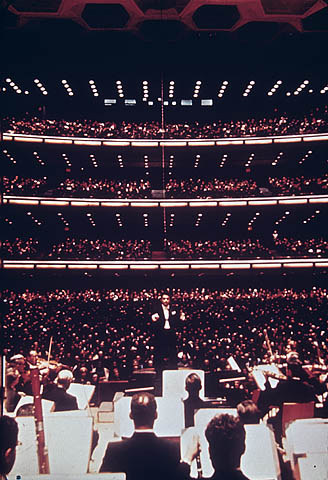|
DALEY AT EXPO Gala Program Kicks Off Expo Entertainment Binge By FRANK DALEY of The Ottawa Journal MONTRÉAL - Expo's massive entertainment program opened Saturday night with a gala inauguration presentation of a new poem set to music. The appearance of two of the world's foremost actors, three mixed chorus and the Montréal Symphony Orchestra playing Beethoven's "Ode To Joy" from the Ninth Symphony. Place des Arts' grand salle, the Salle Wilfred Pelletier, was aglitter with jewels and beautiful gowns for the opening of the world festival. |
|
|
|
DUAL RECITAL Actors Sir Laurence Olivier of the National Theatre of Britain and Jean Louis Barrault cited a text written by Pierre Dupuy, commissioner general of Expo '67. The text traced man's development from the cave to his exploration of space; from his fashioning of weapons to defend himself and kill for his food, to his work as a creator and artist in all things -- poetry, philosophy, music, painting. The text of Mr. Dupuy's address was not particularly memorable but it did focus attention on the elements of man's life and it was recited extremely well, of course, and Mr. Barrault in French. The new poem, "Terre des Hommes", was written by a 30-year-old Québec poetess, Michelle Lalonde. Miss Lalonde's work was inspired by the theme of Expo which is Man and His World. The title is taken from the writings of French author Antoine de St. Exupery. The poem was integrated with original music by Montréal composer Andre Prevost and together the units swelled through the theatre with the three choruses (The Montréal Symphony Choir was joined by the Rutgers University Choir) and the Montréal Symphony under the direction of Pierre Hetu. Actors Albert Millaire and Michele Rossignol narrated the poem with the orchestra and the choruses as accompaniment. |
|
"Terre des Hommes" was conceived by Miss Lalonde as "a sort of screen onto which the crucial preoccupations, the high hopes and the acute anxieties of contemporary man could be projected in a succession of violently antithetic metaphors." The poem is divided into three major parts. Alienation -- in which the author expresses the feelings of awe, estrangement and solitude, conveyed by the steel and concrete landscape typical of this century. Identification -- in which the author expresses love for nature and for mankind through two lovers; and Humanization -- in which the author expresses the hope and the feeling that although man is faced with total destruction, he will be able to return to the concepts of justice and peace which will not only save him but result in his rebirth. Mr. Prevost's music is a swirling, exciting and often eerie composition which requires a full symphony orchestra. The emphasis is placed on the strings although both brass and percussion are important and considerable use is made of such instruments as the xylophone, vibraphone, glockenspiel, temple blocks, gong and claves. Wilfred Pelletier himself conducted the orchestra in "The Ode To Joy". The parts were sung by Pierrette Alaire, soprano, Maureen Forrester, contralto, Leopold Simoneau, tenor, and Joseph Rouleau, bass. - End of Article. Copyright by The Ottawa Journal, May 1, 1967. All rights reserved.
|
|

